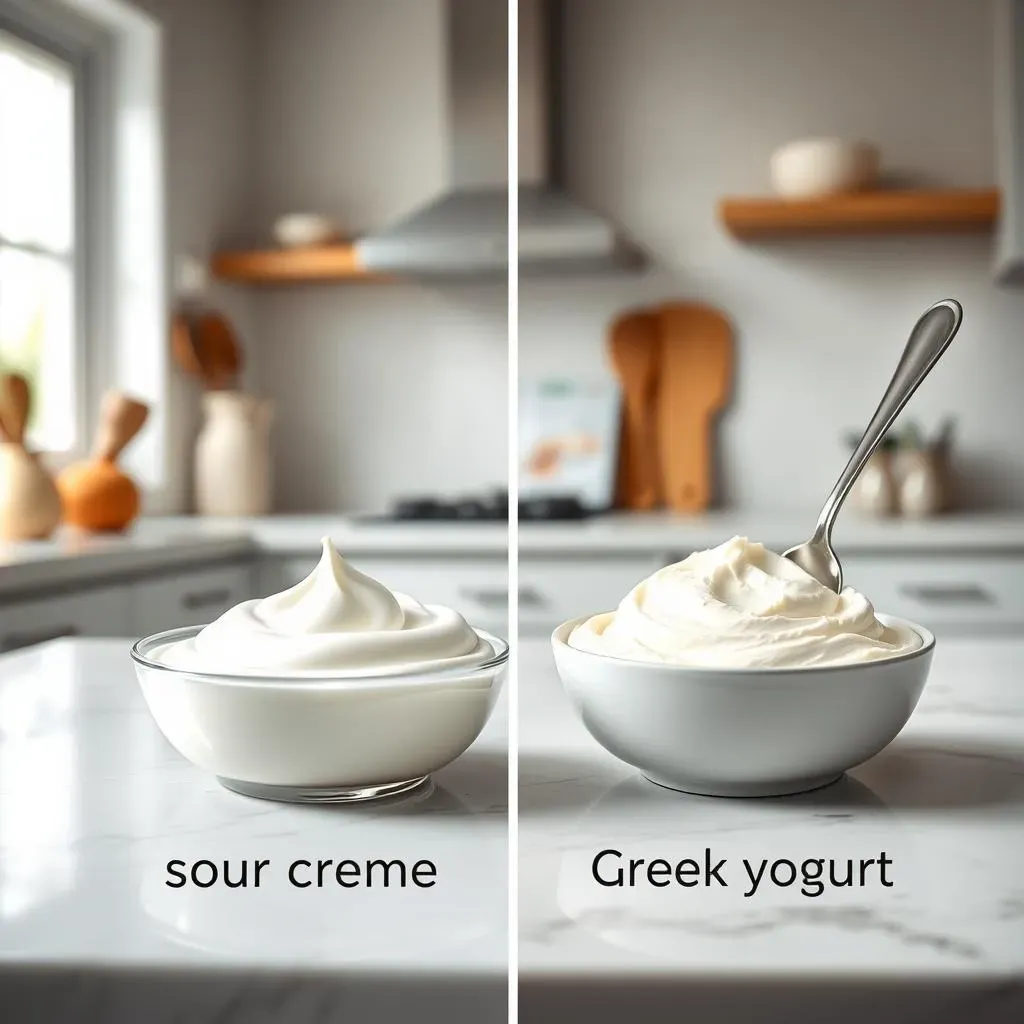Table of Contents
Ever stared blankly at a recipe, realizing you're missing a key ingredient? Specifically, have you ever wondered, "Can sour cream substitute for Greek yogurt?" This happens more often than you think! This article is your ultimate guide to navigating the creamy world of dairy swaps. We'll tackle the burning question: can sour cream substitute for Greek yogurt, and if so, under what circumstances? We'll explore the subtle differences in taste and texture between these two popular dairy products, examining how these differences impact various recipes. Get ready to discover whether a simple swap is possible, or if a little culinary creativity is needed to achieve the desired results. We'll explore both sweet and savory applications, providing practical tips and advice along the way. Prepare to become a dairy-swapping pro! So, let's dive in and uncover the delicious truth behind this common kitchen query.
Sour Cream vs. Greek Yogurt: A Taste Test

Sour Cream vs. Greek Yogurt: A Taste Test
Texture Tango: A Creamy Comparison
Let's get down to the nitty-gritty: texture. Sour cream boasts a delightfully smooth, almost velvety consistency. Think of it as a luxurious cloud of creamy goodness. Greek yogurt, on the other hand, tends to be thicker and a bit more… well, *yogurty*. It's still creamy, but with a slightly firmer, almost slightly grainy mouthfeel. This difference in texture is crucial when considering substitutions, especially in baking where the final product's consistency is paramount. For example, substituting sour cream for Greek yogurt in a cheesecake might lead to a slightly less smooth texture. Check out our guide on substituting Greek yogurt in cheesecake for more details!
Think of it like this: sour cream is the silky smooth, decadent chocolate mousse, while Greek yogurt is the robust, slightly tangy chocolate pudding. Both are delicious, but their textures are undeniably different. Knowing this distinction will help you make informed decisions when choosing between these two dairy delights. If you're looking for a tangier option, you can find out more about substituting sour cream for yogurt in certain recipes.
Characteristic | Sour Cream | Greek Yogurt |
|---|---|---|
Texture | Smooth, velvety | Thicker, slightly grainy |
Fat Content | Higher | Lower (generally) |
Tangy Tales: A Flavor Face-Off
Now, let's talk taste. Sour cream has a distinctly tangy, slightly acidic flavor profile. It's that perfect balance of sharp and creamy that makes it a star ingredient in so many dishes. Greek yogurt also possesses a tang, but it's often a bit more subtle and less pronounced than sour cream's. Some Greek yogurts are even quite mild in flavor. The level of tanginess can vary depending on the brand and type of Greek yogurt used. This difference in tang can significantly alter the flavor of a recipe, so keep that in mind when making substitutions. For instance, if you swap sour cream for Greek yogurt in a dip, you might find the overall flavor less sharp.
Imagine this: you're making a creamy tomato soup. Sour cream adds that signature tangy kick that complements the tomatoes perfectly. Greek yogurt, while adding creaminess, might not deliver that same level of zip. However, if you prefer a milder flavor, Greek yogurt could be a better fit. Learning to appreciate these nuanced differences is key to mastering dairy substitutions. If you are looking for other alternatives, you may find our guide on substituting yogurt for sour cream helpful.
- Sour cream: Sharper, more pronounced tang
- Greek yogurt: Milder tang, varies by brand
Fat Factor: A Calorie Conundrum
Let's not forget the elephant in the room: fat content. Sour cream is typically higher in fat than Greek yogurt. This fat content contributes significantly to its rich, creamy texture and mouthfeel. Greek yogurt, especially the low-fat or non-fat varieties, tends to be lower in fat. This difference can affect the final texture and richness of your recipe. For example, swapping sour cream for low-fat Greek yogurt in a creamy pasta sauce might result in a slightly thinner and less decadent sauce. If you're watching your calorie intake, Greek yogurt might be the healthier choice, but the difference in texture and richness must be considered.
This isn't just about calories; it's about how the fat content influences the overall sensory experience. The higher fat content in sour cream creates a richer, more luxurious feel in the mouth. This is something to keep in mind when making substitutions, particularly in dishes where texture and richness are key components. You might also want to explore substituting sour cream for milk in some recipes.
"The best substitute is often the one that best suits your palate and the specific recipe you're working with." - Anonymous Culinary Expert
Baking with Sour Cream Instead of Greek Yogurt: What to Expect

Baking with Sour Cream Instead of Greek Yogurt: What to Expect
Cakes and Muffins: A Creamy Conundrum
So, you're baking a cake and you're out of Greek yogurt. Can you use sour cream instead? The answer, as with most culinary questions, is: it depends! Sour cream's higher fat content will likely result in a moister, richer cake. However, its sharper tang might clash with some delicate flavors. For a vanilla cake, the extra richness might be a welcome addition. But for a lemon cake, the extra tang could be overpowering. It's all about balance!
Think of it like this: Greek yogurt often adds a subtle tang and lightness. Sour cream brings a richer, denser texture and a more pronounced tang. Consider the overall flavor profile of your recipe. If you're baking something like muffins, where a slightly denser texture isn't necessarily a bad thing, sour cream might work surprisingly well. For delicate cakes, however, proceed with caution! If you are unsure about the right substitution for baking, you may find this guide on substituting Greek yogurt in baking useful.
- Cakes: Sour cream can add richness but might alter the flavor profile.
- Muffins: Sour cream can work well, adding moisture and a tangy twist.
- Cookies: Generally not recommended; sour cream's higher moisture content can affect texture.
Bread and Quick Breads: A Doughy Dilemma
Now let's move on to bread and quick breads. Here, the higher moisture content of sour cream compared to Greek yogurt can be a double-edged sword. It can add moisture and tenderness, but too much moisture can lead to a gummy or dense loaf. This is especially true in recipes that already call for other moist ingredients, like bananas or applesauce. If you're baking a loaf of banana bread, for instance, the extra moisture from the sour cream might make it too dense and heavy.
Again, it depends on the specific recipe. For some quick breads, like cornbread, the extra tang and moisture of sour cream can actually enhance the flavor and texture. However, for yeast breads, it's generally recommended to stick with the original recipe. If you're looking for other alternatives for baking, check out our guide on substituting yogurt in baking for more ideas.
Bread Type | Sour Cream Substitution | Notes |
|---|---|---|
Quick Breads (muffins, cornbread) | Often works well | May add extra moisture and tang |
Yeast Breads | Not recommended | May result in a dense or gummy loaf |
Savory Dishes: Swapping Sour Cream for Greek Yogurt in Recipes

Savory Dishes: Swapping Sour Cream for Greek Yogurt in Recipes
Dips and Spreads: A Creamy Conundrum
Let's start with dips and spreads. Sour cream's higher fat content creates a richer, creamier texture in dips like French onion dip or spinach artichoke dip. Greek yogurt, while providing a tangy element, can result in a thinner, slightly less decadent dip. However, the lower fat content might be a healthier alternative for those watching their waistlines. The tangier flavor of sour cream also tends to cut through richer flavors, making it a great choice for dips that include things like cheese or bacon. If you're making a seven-layer dip, for instance, sour cream's tanginess would balance out the other flavors better than Greek yogurt would.
Consider this: a creamy dill dip made with sour cream will have a richer, more luxurious mouthfeel, while a similar dip made with Greek yogurt will be lighter and potentially a little more tangy. The choice depends on your preferences and the other ingredients in the dip. For more dairy substitution ideas, check out our guide on cream cheese as a sour cream substitute.
Ingredient | Sour Cream | Greek Yogurt |
|---|---|---|
Texture | Rich, creamy | Lighter, thinner |
Flavor | Tangy, sharp | Milder tang |
Sauces and Dressings: A Flavorful Face-Off
Moving on to sauces and dressings, the differences between sour cream and Greek yogurt become even more apparent. In creamy sauces, sour cream's higher fat content contributes to a richer, silkier texture. Think of a creamy tomato soup – sour cream adds a lusciousness that Greek yogurt can't quite replicate. However, Greek yogurt can be a lighter, healthier alternative in dressings and sauces where a thinner consistency is acceptable. If you're making a vinaigrette, for example, Greek yogurt can add creaminess without weighing down the dressing.
For instance, in a creamy mushroom sauce, sour cream will create a richer, more decadent sauce. Greek yogurt, on the other hand, might result in a slightly thinner, less rich sauce. The choice often depends on the overall flavor profile of the dish and personal preference. For more information on dairy substitutions, you might find our post on sour cream as a creme fraiche substitute insightful.
- Creamy sauces: Sour cream adds richness and a sharper tang.
- Dressings: Greek yogurt can offer a lighter, healthier alternative.
- Chutneys: Sour cream adds a creamy texture and tang, while Greek yogurt might be too thin.
Main Dishes: A Culinary Crossroads
Finally, let's consider main dishes. Here, the substitution can be trickier, as the impact on texture and flavor can be more pronounced. In dishes like chili, sour cream adds a creamy richness and a sharp tang that balances the spiciness. Greek yogurt, while providing a tangy element, might not have the same effect. The higher fat content of sour cream also helps to create a thicker, more satisfying chili. In other dishes, however, Greek yogurt's lower fat content might be preferable. For example, in a lighter dish like chicken enchiladas, Greek yogurt might make a better choice, adding a subtle tanginess without overpowering the other flavors.
Think about a creamy potato gratin. Sour cream adds a rich, decadent flavor and texture that's hard to replicate with Greek yogurt. In a lighter dish, like a Greek salad, however, Greek yogurt could be a healthier and equally delicious choice. Ultimately, the best approach is to experiment and find what works best for you. For other dairy replacement options, take a look at our guide on substituting sour cream for milk in scalloped potatoes.
"The key is to understand the nuances of each ingredient and how they interact with other flavors and textures." - Chef Jean-Pierre Papineau